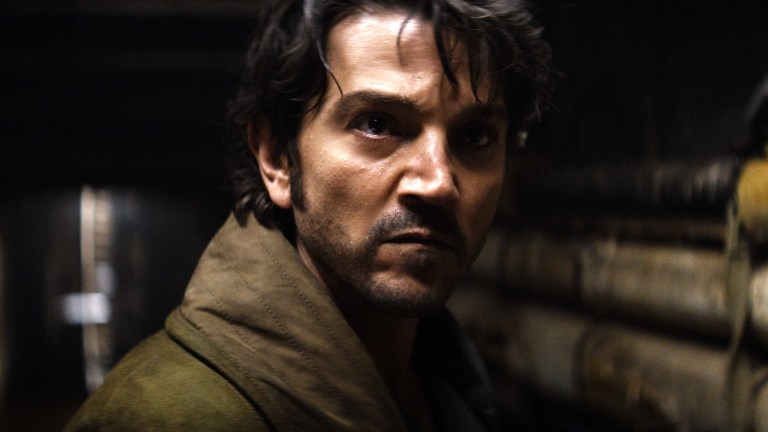Andor Episode 12 Review: The Finale Doesn’t Quite Justify Longer Star Wars Series
Cassian comes full circle as Andor suggests a different vibe for season 2.

This Star Wars: Andor contains spoilers.
Andor Episode 12
In the season 1 finale of Andor, characters previously siloed to different parts of the galaxy converge on a funeral on Ferrix, and all hell breaks loose. By the end of it all, Cassian and Luthen arrive at a similar emotional place as they did in episode 3, but back then, Cassian was resisting the call to adventure in his hero’s journey. By the end of season 1, the message of Andor’s finale is clear: Cassian is ready to embrace his destiny and the Rebellion is about to heat up big time. And stick around until the end for a post-credits scene that finally answers what Cassian and the other prisoners on Narkina 5 were building all along…
After separating from Melshi, Cassian heads back to Ferrix to attend Maarva’s funeral, and in the process, he also plans to rescue Bix from the vile clutches of the evil ISB. All the other characters (minus Mon Mothma) also head to Ferrix, because everyone is trying to catch and/or kill Cassian, and both the Empire and Rebels know that’s where he’s headed. Fortunately, Vel, Cinta, Syril, Dedra, and Luthen, are all prevented from taking out their target, thanks to Maarva’s posthumous final stand against against the Empire, and Cassian’s plan more of less works.
A pre-recorded hologram of Maarva becomes the real hero, as her visage-from-beyond-the-grave urges her fellow citizens to “fight the Empire!” (It’s a stunning farewell for the brilliant Fiona Shaw in the Star Wars universe). The funeral unsurprisingly turns into a riot, which, gives us one of the most realistic, ground-level portrayals of what it’s like living under the rule of the Galactic Empire. If Andor’s goal was to argue against the complacency of Luke Skywalker in A New Hope (“There’s nothing I can do about it right now!”) then this scene works wonders.
And yet, as thrilling as the Andor season 1 finale is, one can’t help but feel that this slow-burn show just suddenly stopped. In fact, the narrative flow of the series as a whole feels frustratingly incongruous, apparently by design. Does Andor season 1 really justify its 12-episode journey?
Andor began as a show about a guy looking for his sister and ends up being about a guy who wants to join a revolution for reasons totally unconnected to any of the reasons he got into trouble in the first place. This is okay, and reflective of real life insofar as things often unfold in ways that are unpredictable and unconnected to our original intentions. And yet, from a novelistic perspective, what does Cassian want? And do those motivations actually carry forward in the story? Sometimes it just feels like a bunch of random things are happening to him. On Instagram, author Leigh Stein recently referred to this as the “Alice in Wonderland problem.” Basically, a character is bounced around like a “pinball in a machine,” but we’re not sure what the character’s motivations are. Now, Andor is not a novel, but because it has novelistic aspirations, it’s unclear if the series really believes Cassian has much agency within his own story. Is he making decisions? Or just being bounced around to different places in the Star Wars universe in order to get to his inevitable Rogue One ending?
The version of Cassian who emerges from the prison on Narkina 5 is similar enough to the person who went into that prison. You could easily imagine a bizarro version of the season that went like this: We start with Cassian on vacation, then he gets arrested, then he goes to Narkina 5, then he breaks out, then he meets up with Luthen, then they do the heist on Aldhani, then Nemik dies, then Cassian is lured back to Ferrix for the funeral of his mother, and the show ends pretty much the same way. If we can reorder the plot points of Andor, and arrive at similar emotional epiphanies, regardless of causes and effects, then suddenly we have to search for the one plot point that does matter and can’t be arbitrarily moved.
For Andor, that thing is probably the prison storyline. That’s the thing that keeps him away from his mother and it’s the only thing that delays all the other characters from coming to the same place in the end. None of the other storylines were allowed to really move forward at any kind of reasonable pace while Cassian was in prison. Think about it: At least one-third of the show was focused on Imperial operatives looking for a person they’d already locked up on accident.
In other words, there’s something contrived about the finale of Andor that works slightly against the naturalism the series so often strives for. Paradoxically, by not connecting more dots in this finale, by not making more callbacks to the way in which the show began (where’s Andor’s sister!!), the loosey-goosey plotting only makes the show seem less realistic, instead of more. Bringing Andor and Luthen back together makes clear that heroic journeys aren’t always straight lines, and that’s good. But I’m not sure Andor needed 12 episodes to make this point.
We know Andor season 2 will be different. The ending promises us that. It can be argued that Andor season 1 succeeds mostly by playing against our desire for a more straightforward adventure flare. That tension is what defines the series, and that’s mostly to its credit. It’s not trying to be a crowd-pleaser. And yet, there’s a fine line between making a narrative decision because it’s not what we expect and making that same decision because it makes sense. What remains to be seen in season 2 is if the show can pull off a bigger trick: Andor has successfully proven what kind of show it isn’t. But it’s still not clear if we know what kind of show it is.
